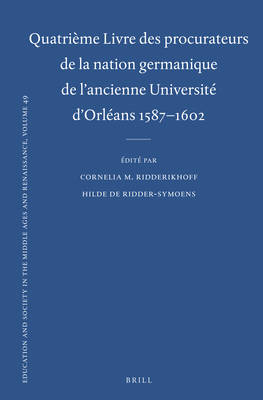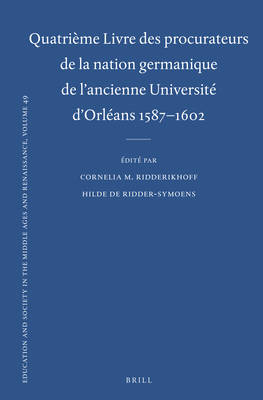
- Afhalen na 1 uur in een winkel met voorraad
- Gratis thuislevering in België vanaf € 30
- Ruim aanbod met 7 miljoen producten
- Afhalen na 1 uur in een winkel met voorraad
- Gratis thuislevering in België vanaf € 30
- Ruim aanbod met 7 miljoen producten
Zoeken
Quatrième Livre Des Procurateurs de la Nation Germanique de l'Ancienne Université d'Orléans 1587-1602
Texte Des Rapports Des Procurateurs
Ridderikhoff Cornelia
€ 209,11
+ 418 punten
Omschrijving
The four Livres des procurateurs de la nation germanique de l'Université d'Orléans (1444-1602) are a unique source for the history of European universities. The quarterly reports of the presidents of the association of law students allow us to reconstitute in detail the everyday life of students from the Germanic countries during the Renaissance. From the published first, second and third Livres between 1444-1587 (same authors, Brill 1971-2013) it appears that the alumni got key positions in Church and State in their homelands. The reports of the fourth Livre for the years 1587-1602 describe the fortunes of the German Nation and the University and offer a unique look at the role of Orleans and its graduates in the religious wars and the growing confessionalisation of Europe.
Specificaties
Betrokkenen
- Auteur(s):
- Uitgeverij:
Inhoud
- Aantal bladzijden:
- 676
- Taal:
- Frans
- Reeks:
- Reeksnummer:
- nr. 49
Eigenschappen
- Productcode (EAN):
- 9789004287631
- Verschijningsdatum:
- 18/05/2015
- Uitvoering:
- Hardcover
- Formaat:
- Genaaid
- Afmetingen:
- 165 mm x 239 mm
- Gewicht:
- 1111 g

Alleen bij Standaard Boekhandel
+ 418 punten op je klantenkaart van Standaard Boekhandel
Beoordelingen
We publiceren alleen reviews die voldoen aan de voorwaarden voor reviews. Bekijk onze voorwaarden voor reviews.











